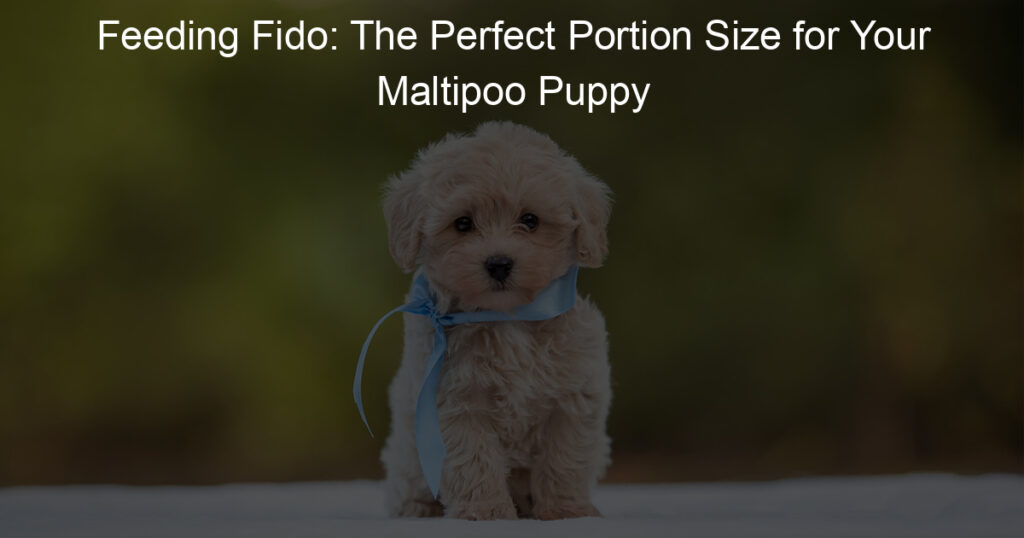Introduction to Feeding Your Maltipoo Puppy
-
- Proper Nutrition for Your Maltipoo Puppy
The right balance of proteins, carbohydrates, fats, vitamins, and minerals ensures your puppy grows into a healthy and active adult dog. According to Wikipedia, puppies require up to twice the energy intake of adult dogs and, depending on the breed, the diet must be properly balanced with these nutrients. A well-fed Maltipoo puppy will have a shiny coat, clear eyes, and an energetic demeanor. Poor nutrition can lead to health issues like obesity, dental problems, and a weakened immune system.
-
- The Maltipoo Puppy’s Dietary Needs
Typically weigh between 5 to 20 pounds and require a diet rich in protein to support their rapid growth. They also need a good amount of carbohydrates for energy, and healthy fats for a shiny coat and skin. Puppies should be fed small, frequent meals to prevent overeating and ensure they’re getting the nutrients they need throughout the day. Always consult with your vet to determine the best diet for your Maltipoo puppy.
Best Food for Maltipoo Puppy
The right food is crucial for their growth and overall health. One of the best options to consider is commercial dog food.
Commercial Dog Food
- Benefits of Commercial Dog Food
It’s specifically formulated to meet the nutritional needs of dogs at different stages of life. These foods contain a balanced mix of proteins, carbohydrates, fats, vitamins, and minerals that your puppy needs to grow and thrive. Plus, they’re convenient and easy to serve, saving you time and effort.
- Recommended Brands for Maltipoo Puppies
-
- Hill’s Science Diet Puppy Food: This brand is known for its scientifically-formulated recipes that promote healthy growth and development.
- Royal Canin Maltipoo Puppy Food: Specifically designed for Maltipoo puppies, this food offers balanced nutrition and supports digestive health.
- Blue Buffalo Life Protection Formula: Offers natural, healthy, and tasty food that your Maltipoo puppy will love.
Maltipoo Homemade Food
- Advantages of Homemade Food
It allows you to control the quality and quantity of ingredients. This means you can ensure your puppy is getting the right nutrients in the right amounts. Homemade food can be more digestible for your puppy, leading to better absorption of nutrients. Avoid the preservatives and additives found in some commercial dog foods, which can sometimes lead to allergies or other health issues.
- Recipes for Maltipoo Puppies
Chicken and Vegetable Stew
- 2 chicken breasts
- 1 cup of chopped carrots
- 1 cup of peas
- 2 cups of water
Beef and Rice Dinner
- 1 pound of ground beef
- 1 cup of cooked brown rice
- 1 cup of steamed broccoli
Can Maltipoo Eat Human Food?
-
- Safe human foods for Maltipoo
-
-
- Lean meats: Chicken, turkey, and fish are excellent sources of protein for your Maltipoo. Make sure they are cooked and unseasoned.
- Fruits and Vegetables: Apples, bananas, carrots, and green beans are safe for your Maltipoo. They provide essential vitamins and minerals.
- Rice and Pasta: These can be a good source of energy when served in moderation. Ensure they are cooked and plain.
-
-
- Human foods to avoid
-
-
- Chocolate: It contains theobromine, which is toxic to dogs.
- Onions and Garlic: These can damage your Maltipoo’s red blood cells, leading to anemia.
- Avocado: It contains persin, a toxin that can cause vomiting and diarrhea in dogs.
- Grapes and Raisins: These can cause kidney failure in dogs.
-
If your Maltipoo ingests any of these foods, contact your vet immediately.
While some human foods can be a healthy addition diet, others can be dangerous. Always consult with your vet before introducing new foods.
How Much Should a Maltipoo Eat a Day?
Feed the right amount of food for their health and well-being. The amount they should eat can vary depending on their age, size, and activity level. Overfeeding can lead to obesity, while underfeeding can result in malnutrition.
Feeding Guidelines for Maltipoo Puppies
-
- How much food should a Maltipoo puppy eat
Typically eat about 1/4 to 1/2 cup of puppy food per meal. This amount can vary depending on the size of your puppy and the type of food you’re feeding them. Always check the feeding instructions on the food packaging for more accurate measurements.
-
- How often should a Maltipoo puppy eat
Should be fed three to four times a day. Feeding them at regular intervals will help maintain their blood sugar levels and provide them with a steady source of energy throughout the day. As they grow older, you can gradually reduce the number of feedings to two times a day.
These are just guidelines and each puppy is unique. Always monitor your puppy’s weight and adjust their food intake as necessary.
What Should I Feed My Maltipoo Puppy?
-
- A Balanced Diet
It helps in maintaining their energy levels, supporting their immune system, and promoting healthy growth and development. A balanced diet should include proteins, carbohydrates, fats, vitamins, and minerals. Each of these nutrients plays a unique role in supporting your puppy’s health. Proteins are essential for tissue repair and growth, while carbohydrates provide energy.
-
- Essential Nutrients for Maltipoo Puppies
-
-
- Protein: Crucial nutrient for your Maltipoo puppy’s growth and development. It helps in building and repairing tissues, making it essential for your puppy’s growing muscles. Sources of protein include chicken, beef, and fish.
- Fats: Provide energy and help in the absorption of certain vitamins. They also contribute to healthy skin and a shiny coat. Good sources of fats include fish oil and flaxseed.
- Carbohydrates: They should come from high-quality sources like sweet potatoes and brown rice.
- Vitamins and Minerals: Support various bodily functions, including bone health, vision, and immune function. They can be found in fruits, vegetables, and specially formulated puppy foods.
-
How Many Times a Day Should a Maltipoo Poop?
One way to gauge this is by monitoring how often your Maltipoo poops. This might seem like a strange thing to keep track of, but it can provide valuable insights into your pet’s overall health.
-
- Maltipoo’s digestive system
Designed to process food and extract the necessary nutrients. On average, should poop between 1 to 5 times a day. This frequency can vary based on factors such as diet, age, and overall health. Puppies, for instance, tend to poop more frequently than adult dogs. If you notice any drastic changes in your Pooping habits, it might be a sign of a digestive issue and warrants a visit to the vet. For more detailed information about a Maltipoo’s digestive system, you can visit Wikipedia’s page on Dog Anatomy.
-
- Signs of healthy and unhealthy stool
The appearance of stool can also indicate its health. Healthy stool is firm, moist, and dark brown in color. Unhealthy stool can be too hard or too soft, may contain blood or mucus, or may be an unusual color. These could be signs of dietary issues, infection, or other health problems. If you notice any of these signs, it’s best to consult with your vet immediately.
Keeping track of pooping habits can be a useful tool in monitoring its health. Any significant changes in frequency or appearance should be discussed with a vet. By staying vigilant, you can ensure your Maltipoo’s health and happiness.
Conclusion: Ensuring Your Maltipoo’s Healthy Growth
-
- Regular vet check-ups
These visits allow your vet to monitor your pup’s growth, detect any potential health issues early, and provide necessary vaccinations. According to the American Veterinary Medical Association, puppies should have their first vet visit at around six to eight weeks of age, followed by monthly check-ups until they are about four months old. After this, bi-annual or annual visits are recommended, depending on your vet’s advice.
-
- Monitoring your Maltipoo’s weight and growth
Small dogs, and their weight should typically range between 5 to 20 pounds, depending on their size and gender. Regularly weighing and tracking their growth can help you spot any sudden weight loss or gain, which could indicate a health problem. It also helps you adjust their food portions as needed to maintain a healthy weight.







